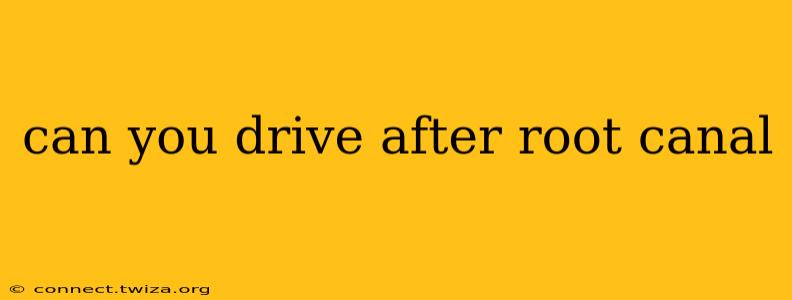Can You Drive After a Root Canal?
The short answer is yes, you can usually drive after a root canal, but there are important considerations. While a root canal itself doesn't directly impair driving ability, the effects of the anesthesia and any potential post-procedure discomfort can. Let's break it down:
What Happens During a Root Canal?
A root canal involves removing infected or inflamed pulp from the inside of a tooth. This procedure requires local anesthesia to numb the area. The numbness is the key factor affecting your ability to drive safely.
The Impact of Anesthesia
The local anesthetic used during a root canal temporarily numbs your mouth and may affect the surrounding areas. This numbness can:
- Impair fine motor skills: This could affect your ability to precisely control the steering wheel, pedals, and other car controls.
- Reduce reaction time: The diminished sensation and altered perception can slow your response to unexpected events on the road.
- Cause drowsiness or dizziness: Some individuals experience drowsiness or lightheadedness as a side effect of the anesthetic.
Therefore, driving immediately after a root canal is generally not recommended until the effects of the anesthesia have completely worn off.
How Long Should I Wait Before Driving?
The duration of the anesthetic's effect varies depending on the type and amount of anesthetic used, as well as individual factors. It's crucial to wait until the numbness has completely subsided and you feel fully alert and coordinated. This typically takes a few hours, but it could be longer in some cases.
It's best to err on the side of caution and arrange for alternative transportation home. Have a friend or family member drive you, or use a ride-sharing service.
What if I Experience Pain or Discomfort After the Root Canal?
While most people experience minimal post-procedure discomfort, some may feel pain or soreness. Pain medication prescribed by your dentist might cause drowsiness. If you are taking pain medication, you should absolutely not drive until the medication's drowsiness has worn off completely. Check the medication's label for driving instructions.
What if I’m on Other Medications?
Certain medications, even those not prescribed for your root canal, can interact with anesthetics or pain relievers, further increasing the risk of drowsiness and impaired driving ability. Always consult your dentist and/or physician before driving if you are taking any medications.
In Summary: Prioritize Safety
Driving safely requires your full attention and coordination. After a root canal, your judgment might be impaired due to anesthesia or medication. Prioritizing your safety and the safety of others is paramount. Plan your transportation beforehand and never drive under the influence of anesthesia or medication that might impair your driving abilities.
This information is for general knowledge and does not constitute medical advice. Always consult with your dentist or healthcare provider for personalized guidance regarding driving after a root canal or any dental procedure.
